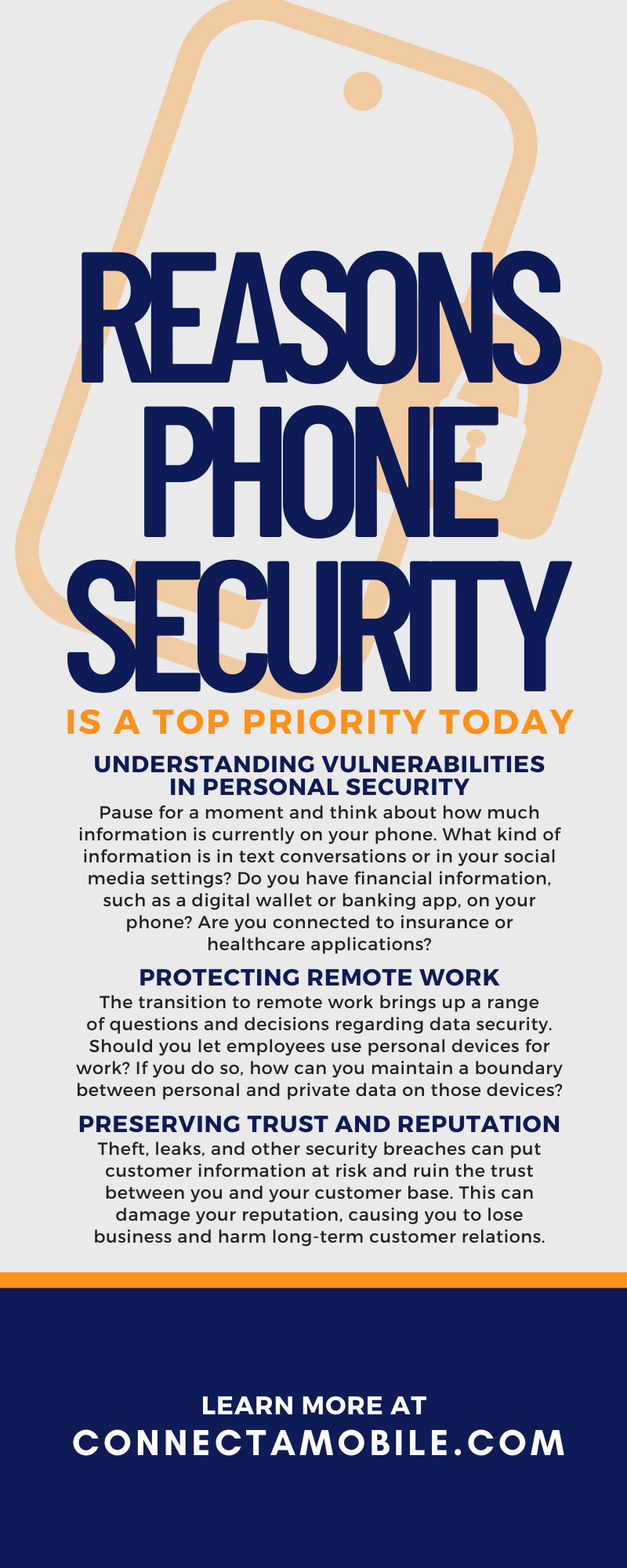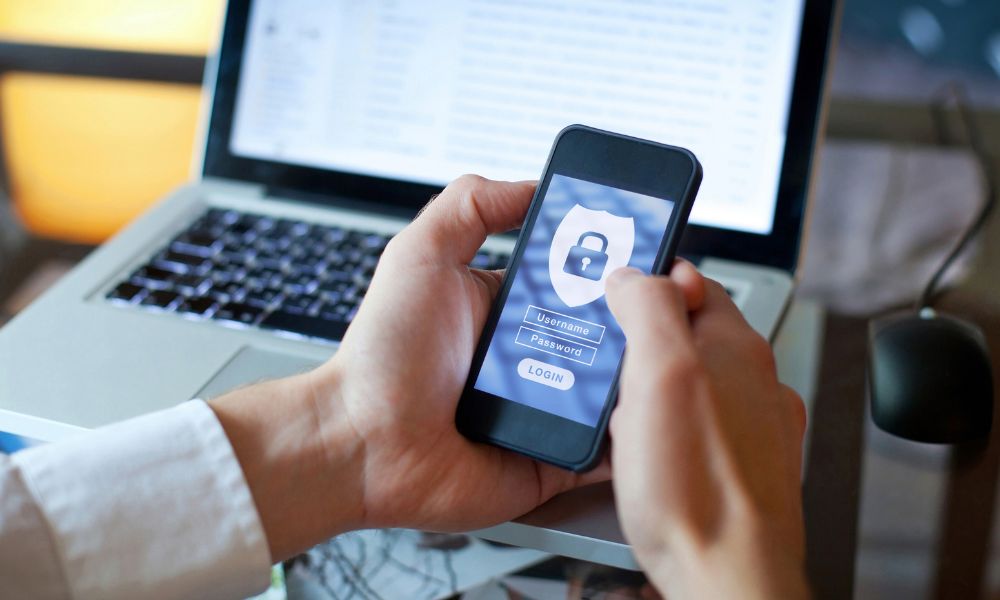Digital security is not a new trend; it has been around as long as computer systems and networks have existed. However, today’s digital security landscape looks significantly different than it used to, and it’s evolving even more every year.
As individuals and companies increasingly rely on mobile devices for communication, data storage, and other crucial tasks, the need for phone security has become a top priority. If you’re not careful, the convenience of your mobile device can overshadow its lack of security, leading to critical vulnerabilities on your personal or professional device.
Staying on top of mobile digital security is key to securing your network and ensuring privacy, safety, and confidentiality for all your data and communications. Explore these reasons why phone security is a top priority today and see how you can defend your network and devices from digital threats.
Understanding Vulnerabilities in Personal Security
Mobile phones have become a critical part of personal life, which means they pose a significant risk to your personal data. Pause for a moment and think about how much information is currently on your phone. What kind of information is in text conversations or in your social media settings? Do you have financial information, such as a digital wallet or banking app, on your phone? Are you connected to insurance or healthcare applications?
With so much sensitive information available on your personal device, it is critical to establish strong security measures for your phone. By protecting your device from malware, hackers, and other threats, you can better safeguard your most personal information.
Recognizing Vulnerabilities in Your Work Network
Mobile devices aren’t just personal, though. More and more companies are relying on mobile devices—including work phones and laptops—to conduct business. Though cybersecurity has long been a priority for businesses, many existing practices like robust firewalls and secure data centers only protect permanent, stationary networks. Once mobile devices are part of the equation, everything changes. Companies must take further action to protect their devices and utilize mobile-specific security. If they don’t, every cell phone in the network becomes a loose end that hackers can exploit.
Protecting Remote Work
In recent years, remote work has become more common than ever before. This allows companies to mobilize their operations, providing more convenience and flexibility for their workforces. This doesn’t come without drawbacks, though, because businesses also face extra complications when it comes to protecting data and devices within a remote network. The transition to remote work brings up a range of questions and decisions regarding data security. Should you let employees use personal devices for work? If you do so, how can you maintain a boundary between personal and private data on those devices? How do you protect communications, transactions, and other critical data and information on personal devices?
If you invest in private, dedicated work devices for your team, how can you ensure seamless transitions to those devices? How do you make sure your entire network is connected and accessible from afar without sacrificing security? Prioritizing phone security allows businesses to address these issues so they can empower their teams with tools that are convenient, efficient, and secure.
Preserving Trust and Reputation
From advertisements to transactions, a lot of today’s business takes place online. Customers need to know that they can rely on companies to protect their digital data. Theft, leaks, and other security breaches can put customer information at risk and ruin the trust between you and your customer base. This can damage your reputation, causing you to lose business and harm long-term customer relations. The results can be disastrous for your business, so it’s important to invest in secure mobile networks to prevent data loss and protect your customers’ information.
Adhering to Modern Regulations
As the world of digital security evolves, so do the regulations surrounding it. Compliance laws at the local, national, and industrial levels set specific requirements for data protection. Adhering to these rules is necessary to keep your business open. Paying attention to regulations like the General Data Protection Regulation (GDPR), the Health Insurance Portability and Accountability Act (HIPAA), or any other compliances that affect your industry is a crucial part of running a responsible and successful business. By meeting data-related compliances, you can avoid fines and lawsuits and preserve your reputation as a safe and trustworthy business.
Maintaining Smooth Operations
Security breaches affect more than just digital information. They can disrupt and completely halt your entire operation if you’re not careful. From ransomware holding crucial data captive to man-in-the-middle attacks intercepting and modifying data, cyberattacks can throw off your workflow and create serious, costly downtime across the board. Businesses that rely on a network of Internet of Things (IoT) devices are particularly vulnerable, as any attack that affects one device in your network puts your entire operation at risk.
Prioritizing mobile security means protecting your network so you can minimize downtime and keep your business moving. This allows you to prevent losses in production or sales and continuously provide dependable, effective service to your customers.
Utilizing Sophisticated Mobile App Security
Defending mobile devices requires mobile-specific security measures. This is where mobile apps come in. Mobile apps offer greater convenience than other software applications, but that convenience often comes at the price of security and privacy.
With mobile applications becoming more important—and suddenly being able to handle complex transactions, data storage and access, and other crucial operations—app developers need to be able to keep up. To preserve both convenience and security, you need mobile apps that offer more sophisticated and robust security measures. This means greater care during app development and continuous monitoring and optimization after deployment. Simultaneously, mobile phone manufacturers and service plans must include the latest secure app technology to ensure safe communications, data storage, and more.
Investing in Secure Mobile Devices
With so many reasons to make phone security a top priority, it’s crucial to invest in mobile solutions that place emphasis on privacy and confidentiality. Whether you’re looking for mobile solutions for your personal or professional network, choosing a secure device with a dependable service plan is key to protecting yourself, your contacts, and your data.
Connecta Mobile offers secure mobile devices on a private LTE network to ensure your privacy and security. With on-device encryption, pre-installed security applications, powerful VPN options, and the convenience of unlimited talk, text, and data on a reliable network, we deliver the ultimate security and convenience for your mobile network. Learn more about Connecta Mobile’s secure phone solutions when you sign up for your plan today.

